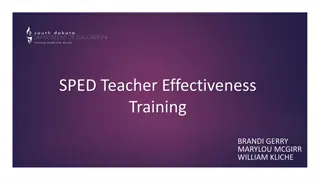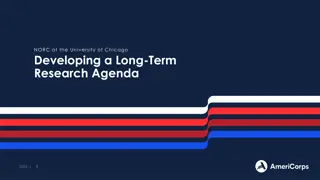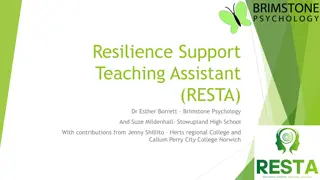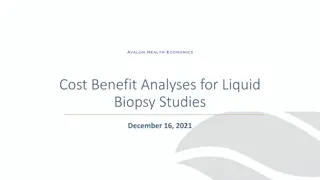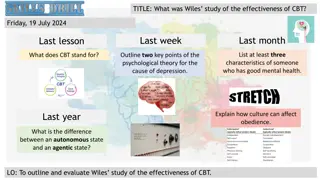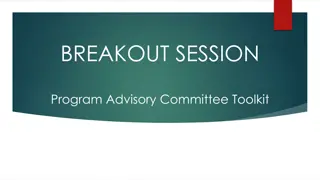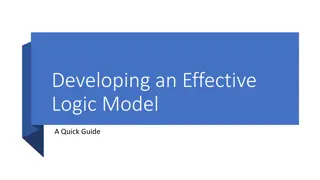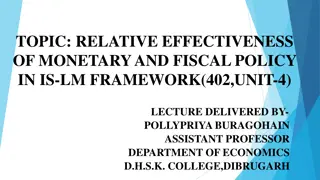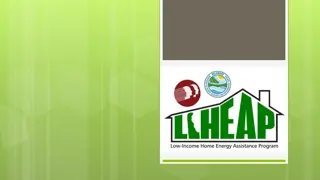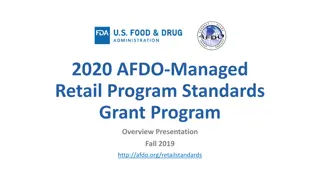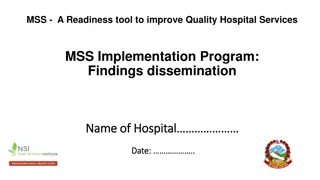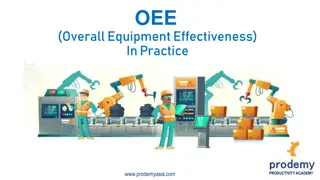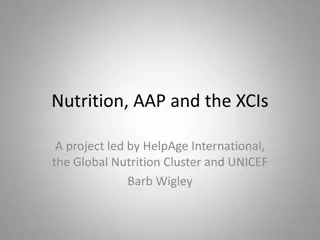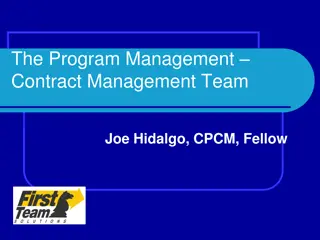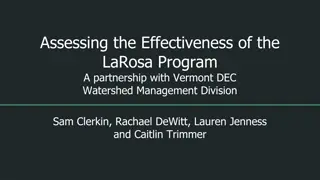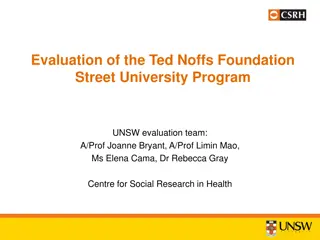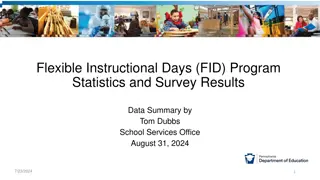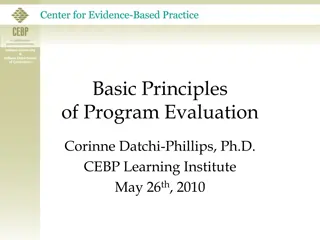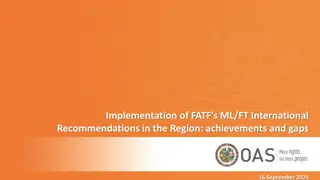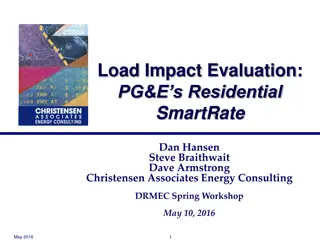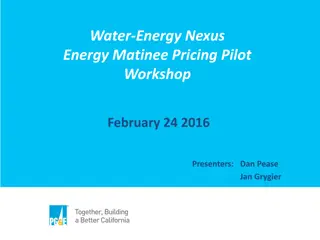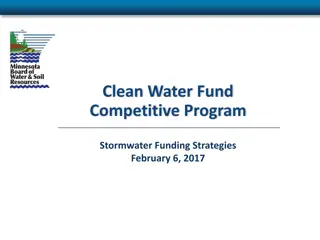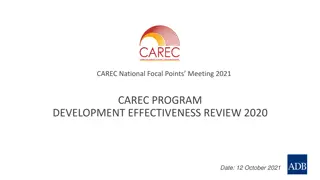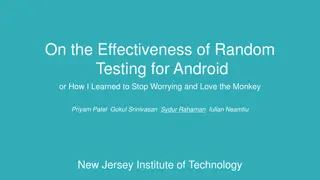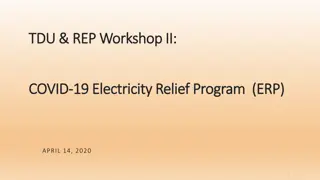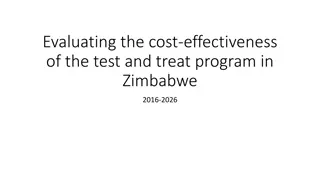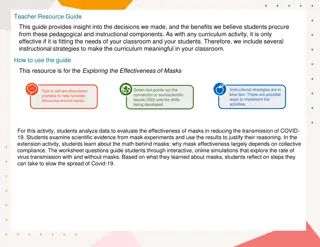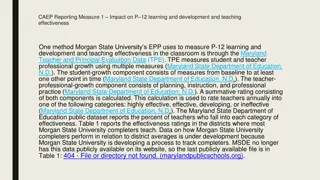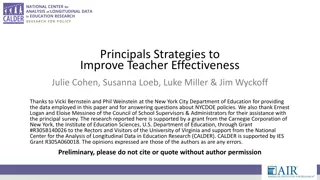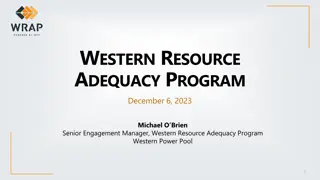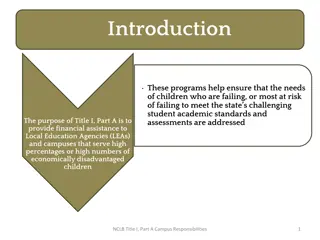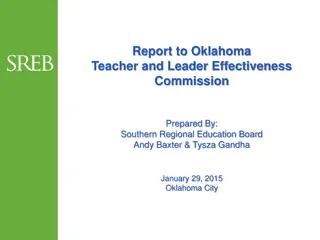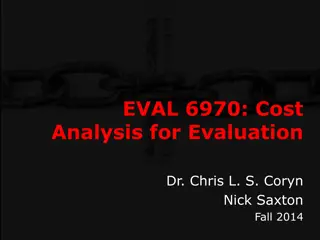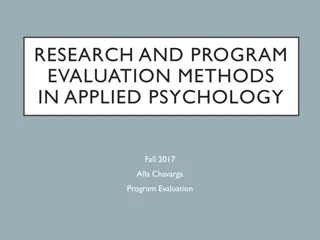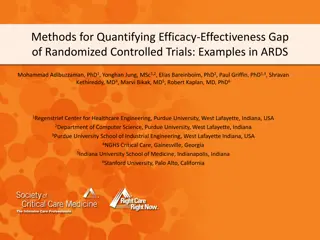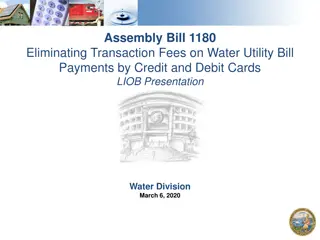Conducting an Outcomes Review Meeting for Program Analysis
This document discusses the process of conducting an outcomes review meeting as a method for program analysis in the context of a CME program. It outlines the objectives, program analysis criteria, and self-study questions related to evaluating the effectiveness of CME activities in meeting the prov
3 views • 28 slides
Understanding Advertising Media Effectiveness
Advertising effectiveness is crucial for brands to assess the impact of their marketing efforts on target audiences. By measuring strengths, weaknesses, and ROI of advertising campaigns, companies can optimize their strategies for future success. Various approaches such as pre-test, post-test, commu
1 views • 10 slides
SPED Teacher Effectiveness Training and Guidelines
This training focuses on enhancing special education teacher effectiveness by covering various aspects such as the SD Teacher Effectiveness Model, Student Learning Objectives, SPED scenarios in relation to the framework for teaching, SLO process, summative scoring matrix, one-year evaluation cycle,
1 views • 53 slides
Building a Strong Foundation for Program Evaluation: Key Steps and Strategies
Learn crucial activities and elements necessary for successful program evaluation, starting from the pre-award period to refining logic models and building evidence of effectiveness over time. Understand the importance of program design, data collection systems, performance measurement, staff capaci
6 views • 34 slides
Developing a Long-Term Research Agenda at NORC, University of Chicago
Explore the significance of establishing a long-term research agenda, understand the stages involved in building evidence of program effectiveness, and identify key considerations for developing a personalized research agenda. Learn why it is essential to have a structured research plan, how it aids
12 views • 40 slides
Resilience Support Teaching Assistant (RESTA) Pilot Program Overview
Dr. Esther Borrett Brimstone and Suze Mildenhall, along with other educators, initiated the RESTA pilot program in various educational settings. The program aims to provide resilience support to students through a structured model focusing on relational practice, psychological safety, and self-deter
0 views • 8 slides
Cost-Benefit Analyses for Liquid Biopsy Studies: Understanding Health Economics and Decision Making
Health economics and decision making play a crucial role in evaluating the clinical utility and cost-effectiveness of liquid biopsies. Economic models such as cost-effectiveness analyses help in determining the incremental cost-effectiveness ratio (ICER) of interventions. Studies have shown varying
0 views • 23 slides
Evaluating the Effectiveness of Cognitive Behavioral Therapy (CBT) in Treating Depression
Wiles' study on the effectiveness of CBT in treating depression highlighted key strengths and weaknesses of the therapy. The study showed that CBT can provide lasting effectiveness by teaching clients skills to manage future episodes of depression. However, it also pointed out that CBT requires sign
0 views • 19 slides
Effective Program Advisory Committee Toolkit for Engaging Members
Enhance the effectiveness of your Program Advisory Committee with actionable tools and strategies. Encourage active participation, ensure diverse representation, and maintain essential documentation to drive program success. Empower members as community advocates and resource connectors, fostering a
2 views • 6 slides
Developing an Effective Logic Model: A Quick Guide
A logic model is a visual representation that illustrates the relationships between resources, activities, outputs, and outcomes of a program. By clarifying these elements, logic models enhance program effectiveness and aid in planning, implementation, and evaluation. They serve as a reference point
0 views • 9 slides
Understanding Monetary Policy Effectiveness in the IS-LM Framework
The relative effectiveness of monetary policy in influencing investment, employment, output, and income depends on the shape of the LM curve and the IS curve. A steeper LM curve signifies higher effectiveness as it indicates less interest elastic demand for money, resulting in significant changes in
0 views • 24 slides
Delaware LIHEAP and Weatherization Assistance Program Details
In Delaware, the Low-Income Home Energy Assistance Program (LIHEAP) is managed by DHSS and DNREC, offering various components like Fuel Assistance Program (FAP) and Crisis Intervention Program (CIP). The program includes eligibility criteria, assistance types, and the Weatherization Assistance Progr
1 views • 5 slides
AFDO-Managed Retail Program Standards Grant Program Overview
The AFDO-Managed Retail Program Standards Grant Program has been successfully ensuring standards are met since 2014. With over 2,500 applications managed and impressive achievements in funded jurisdictions, this program has made significant progress in improving retail standards. Annual reach statis
0 views • 37 slides
Improving Hospital Services Quality Through MSS Implementation Program Findings Dissemination
In this comprehensive report, the effectiveness of MSS Implementation Program in enhancing the quality of hospital services is highlighted. The program aims to motivate local hospital management, provide joint assessment opportunities, and offer external feedback and coaching. The report covers obje
1 views • 24 slides
Understanding Overall Equipment Effectiveness (OEE) in Practice
Overall Equipment Effectiveness (OEE) is a crucial metric that measures the efficiency of production processes. Initially developed by Japanese expert Seiichi Nakajima, optimizing OEE can lead to increased capacity, cost reduction, better quality, and enhanced efficiencies. Measuring OEE allows for
1 views • 10 slides
Enhancing Accountability and Program Quality in Global Nutrition Initiatives
The project led by HelpAge International, the Global Nutrition Cluster, and UNICEF focuses on enhancing accountability and program quality in global nutrition initiatives. It covers various commitments such as leadership/governance, transparency, feedback and complaints, participation, and more. Con
1 views • 12 slides
Understanding the Dynamics of Program and Contract Management Team
The Program Management Contract Management Team, led by Joe Hidalgo, explores the synergy and conflicts between Program Managers and Contract Managers. Highlighting the importance of harmonizing business and program management skills for successful program execution in R&D environments, the content
1 views • 35 slides
Evaluating Effectiveness of LaRosa Program in Partnership with Vermont DEC Watershed Management Division
This project aims to assess the LaRosa program's effectiveness through fostering communication, evaluating its impact, and identifying challenges faced by watershed associations. Various methods such as interviews, surveys, and email communication were used to gather insights. Key questions revolved
0 views • 18 slides
Evaluation of Ted Noffs Foundation Street University Program by UNSW Team
The Ted Noffs Foundation Street University Program evaluation by the UNSW team focused on the program's effectiveness in engaging and maintaining young participants, impact on substance use and mental health, and client and staff perspectives. The evaluation used a prospective cohort study, baseline
0 views • 15 slides
Flexible Instructional Days (FID) Program Overview
The Flexible Instructional Days (FID) Program allows schools to provide remote instruction on days when traditional delivery is not feasible. Schools must apply to the Pennsylvania Department of Education (PDE) to participate in the program, which requires approval by the entity's governing body. FI
0 views • 25 slides
Understanding the Basic Principles of Program Evaluation
This informative content discusses the fundamental principles, goals, and purposes of program evaluation in correctional settings. It covers the objectives of program evaluation, such as improving treatment programs, informing decisions, and enhancing service quality. The key goals include identifyi
0 views • 28 slides
Assessing Implementation of FATF ML/FT Recommendations
Explore the assessment and effectiveness of implementing FATF's ML/FT International Recommendations in the region, analyzing technical compliance, risk factors, and contextual integration. Learn about the rating system, inputs to effectiveness analysis, and ratings for effectiveness levels.
0 views • 19 slides
PG&E Residential SmartRate Program Evaluation
This impact evaluation report assesses the effectiveness of PG&E's Residential SmartRate Program, focusing on load impacts, methodology used, program description, enrollment forecast, and results. The program involves Critical Peak Pricing, bill credits, and high-price period charges on event days.
0 views • 29 slides
Water-Energy Nexus: Pilot Workshop Summary for Potential 2017 Program
The Water-Energy Nexus Pilot Workshop held on February 24, 2016, discussed potential options for the upcoming 2017 program. Some proposed pilot options included leveraging PG&E's Excess Power program, introducing new dynamic and TOU programs, and setting requirements for CPUC decisions on design. A
0 views • 6 slides
Clean Water Fund Competitive Program Overview
The Clean Water Fund Competitive Program focuses on stormwater funding strategies and implementation of on-the-ground restoration activities to improve water quality. It prioritizes local resources, targets effectiveness, and measures impact. The program includes non-point priority funding plans, pr
0 views • 10 slides
CAREC Program Development Effectiveness Review 2020 Summary
CAREC held its National Focal Points Meeting in 2021 to review the development effectiveness of its programs. The Development Effectiveness Review (DEfR) focused on the period 2018-2020 and assessed progress against the CAREC Program Results Framework. Findings highlighted the relevance of CAREC's s
0 views • 4 slides
The Effectiveness of Random Testing for Android
The study explores the effectiveness of random testing tools for Android applications, with Monkey showing the highest coverage level among various tools tested. Monkey's event distribution and inquiries regarding its strategies and coverage analysis are detailed, affirming its effectiveness in stre
0 views • 18 slides
COVID-19 Electricity Relief Program Overview
The COVID-19 Electricity Relief Program (ERP) in Texas was established to assist residential customers facing financial challenges due to the pandemic. This program ensures eligible customers are not disconnected for non-payment, offers Deferred Payment Plans, and stops charging delivery fees for qu
0 views • 21 slides
Evaluation of Cost-Effectiveness of Test and Treat Program in Zimbabwe (2016-2026)
This evaluation focuses on the cost-effectiveness of the Test and Treat program in Zimbabwe from 2016 to 2026. It analyzes the background population, funding structure, decline in MTCT rate, factors fueling HIV spread, and the methodology used. The program aims to simulate transmission trends in hig
0 views • 22 slides
Exploring Mask Effectiveness in Reducing COVID-19 Transmission
This teacher resource guide discusses activities where students analyze data on mask effectiveness in reducing COVID-19 transmission. It includes experiments, evidence, and discussions to help students make informed decisions about health safety measures. The guide provides strategies for implementi
0 views • 4 slides
Institutional Effectiveness and Assessment at B-CU
Jennifer Dash, Director of Institutional Assessment, and Dorian Hooks, Institutional Assessment Coordinator at B-CU, lead the efforts in understanding institutional effectiveness and assessment. Capacity building, creating a common vision, and a framework for institutional effectiveness are highligh
0 views • 35 slides
Measurement of P-12 Learning and Teaching Effectiveness at Morgan State University
Morgan State University's Educator Preparation Program (EPP) utilizes the Maryland Teacher and Principal Evaluation Data (TPE) to measure P-12 learning and teaching effectiveness. The TPE includes student and teacher professional growth components, leading to annual effectiveness ratings for teacher
0 views • 9 slides
Strategies to Improve Teacher Effectiveness in New York City Schools
This research paper explores various strategies implemented in New York City schools to enhance teacher effectiveness. Topics covered include tenure reform, principal strategies, variation in extending teacher probationary periods, and the impact of principal effectiveness on student achievement. In
0 views • 19 slides
Western Resource Adequacy Program Overview
Western Resource Adequacy Program (WRAP) is a vital initiative in the Western Power Pool, providing valuable grid integration and coordination services to its customer-members across the entire Western Interconnection. As the Program Administrator, Western Power Pool undertakes all necessary actions
0 views • 11 slides
Campus Responsibilities under Title I, Part A Programs
Title I, Part A programs aim to address the needs of at-risk children by providing financial assistance to Local Education Agencies (LEAs) and campuses serving economically disadvantaged students. Campuses can operate either a schoolwide program or targeted assistance to raise academic achievement.
0 views • 72 slides
Report on Oklahoma Teacher & Leader Effectiveness Commission Findings
Southern Regional Education Board conducted focus groups in Oklahoma to gather feedback on the Teacher and Leader Effectiveness system. The 131 participants offered insights on various aspects of TLE, including its benefits, concerns, and areas needing clarification. The report highlights the feedba
0 views • 23 slides
Cost Analysis for Evaluation: Strategies and Methods
This document delves into the realm of cost-effectiveness analysis for evaluation purposes, emphasizing the significance of defining measures of effectiveness, distinguishing intermediate versus final outcomes, establishing effectiveness through causal analysis, and exploring different types of rese
0 views • 21 slides
Understanding Program Evaluation Methods in Applied Psychology
Program evaluation in applied psychology involves investigating the effectiveness and impact of social programs or interventions. Its goal is to assess whether the costs of a program are justified, not to produce generalizable knowledge. Evaluation seeks to reduce uncertainty for decision-makers and
0 views • 30 slides
Methods for Quantifying Efficacy-Effectiveness Gap in Randomized Controlled Trials
This research discusses the quantification of the efficacy-effectiveness gap in randomized controlled trials (RCTs), particularly focusing on examples in Acute Respiratory Distress Syndrome (ARDS). It explores the challenges of RCTs, ethical considerations, and the use of observational data for caus
0 views • 8 slides
Eliminating Transaction Fees on Water Utility Bill Payments
Assembly Bill 1180 aims to eliminate transaction fees on water utility bill payments made through credit and debit cards. The bill allows participating water utilities to waive these fees during their General Rate Case cycle, collecting information on payment methods, costs, customer utilization, ex
0 views • 9 slides


